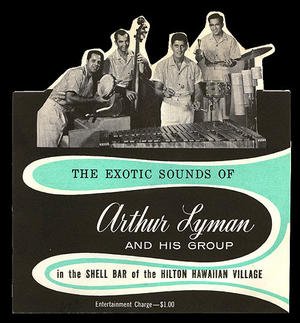Arthur Lyman - Exotica’s Native Son
Born:
February 2, 1932;
Kauai, HI
Died:
February 24, 2002;
Honolulu, HI
A Hawaii native who learned to play music from a a very early age, Arthur Lyman was destined to be an Exotica great.
Over just eleven years, he and his band recorded 33 albums, nearly 400 songs, and won 3 gold records.
The youngest of eight children, Lyman was of Hawaiian, Belgian, French and Chinese extraction. His strict father, a land surveyor blinded in an accident, locked him in a room everyday after school to learn and play music.
With a collection of Benny Goodman records, mallets, and a little toy marimba, Lyman honed his skills. At age 8, he made his public debut playing marimba on KGMB radio's "Listerine Amateur Hour", winning a free bottle of Listerine.
By age 14 he was a professional, playing vibes six nights a week for a jazz group called the Gadabouts.
After graduating high school in 1951, Lyman went to work as a desk clerk at the Halekulani Hotel, burned out from years of constant playing.
Three years later, he was approached by Exotica pianist Martin Denny at work. Denny heard that he played vibraphone very well, and offered him a role in his band. Hesitant at first, Lyman agreed after Denny offered him a weekly salary of $109—quite a bit more than his $280 monthly pay from the hotel.
Over the next three years, he played with Denny’s group mostly at Don the Beachcomber’s and the Shell Bar, owned by steel and shipping magnate Henry J. Kaiser.
One night while playing, Lyman had a few too many drinks and began making bird calls. The audience enthusiastically responded in kind, and before long, they became part of his trademark sound.
Style-wise, Lyman’s music was more flamboyant, transcending traditional Exotica style with a jazz flair mixed in. Like Denny, he took his “jungle” sounds even further, adding in macaw shrieks and monkey calls. In addition to vibes, he also played guitar, piano and drums.
Months after his group formed, they contracted with Hi-Fi Records in Los Angeles. Engineer Richard Vaughn flew in for the production, helping create a three-dimensional hi-fidelity sound by designing a special Ampex 3-track ½” tape recorder.The recording took place inside the Henry J. Kaiser Aluminum Dome, which offered astounding acoustics and a natural 3-second reverberation. With the acoustics, reverberation and Vaughn’s revolutionary contribution, the sound quality was striking, and still holds up even to this day.
Combine all of this with a Polynesia craze in full swing, and Lyman was destined for enormous success.
His Taboo album, released in 1958, was hugely popular, selling more than two million copies and reaching number 6 on Billboard’s album charts. Incredibly, three more albums followed that exact same year – Hawaiian Sunset, Bwana A, and The Legend of Pele.
However, his biggest success came in 1961 with his cover of a Haitian song, Yellow Bird. The single reached #4 and spent ten weeks on Billboard’s Top Ten.
Throughout the rest of the sixties, Lyman released many, many more albums at a furious pace, including Taboo 2, Isle of Enchantment, Polynesia and Aphrodisia.
Three years later, he was approached by Exotica pianist Martin Denny at work. Denny heard that he played vibraphone very well, and offered him a role in his band. Hesitant at first, Lyman agreed after Denny offered him a weekly salary of $109—quite a bit more than his $280 monthly pay from the hotel.
Over the next three years, he played with Denny’s group mostly at Don the Beachcomber’s and the Shell Bar, owned by steel and shipping magnate Henry J. Kaiser.
One night while playing, Lyman had a few too many drinks and began making bird calls. The audience enthusiastically responded in kind, and before long, they became part of his trademark sound.
and his group also performed on many hit TV shows such as The Andy Williams Show, The Red Skelton Showand The Steve Allen Show, along with regular guest appearances on the detective hit Hawaiian Eye.
After his contract with HiFi expired in 1968, Lyman and his combo settled down in Hawaii, no doubt deserving a good rest. Performing each show was a physically demanding task, with each member playing six instruments and changing them every two or three beats.
Throughout the next three decades, they would play at a much more leisurely pace, entertaining tourists on weekends at the New Otani Kaimana Beach Hotel in Honolulu.
In 1990 he and Denny got together for a live CD, Exotica ’90, recorded from their shows in Japan.
Such was the enduring friendship between the two that during Lyman’s final days at a hospice dying from throat cancer, Denny came by to perform a show for him.
After his death, Lyman’s friends and family paddled canoes from Waikiki to Honolulu Bay, where they scattered his ashes in a special ceremony.
There, Martin Denny offered his final tribute : "You are the true spirit of aloha, and may God speed you to your celestial vibes."







